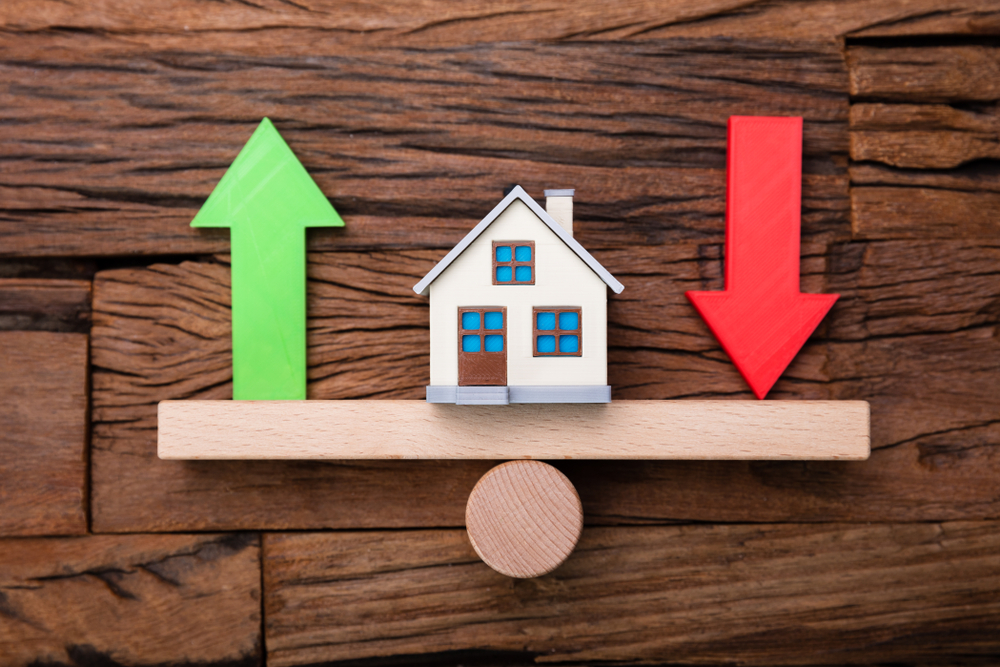What is Housing Market Corrections and Panic Selling
A correction, whether it is in the housing or stock market is when there is a drop in prices. It varies between markets. For example, a housing market correction is when there is a drop of about 10% in prices. In stocks, investors call a drop of between 10 and 20 percent to be a correction.
The word correction is used because it is estimated that the market is at a point where it cannot be sustained further. It needs to fall mildly to bring fundamentals back in line.
Correction is required when homes get too expensive and unaffordable and buyers stop purchasing them. At this point, the market must correct the price levels to boost buying activity once again.
Here it is necessary to distinguish between a housing market correction and a housing market crash. In a correction, prices fall but only enough to restore the balance between supply and demand. In a housing market crash, the fall in prices is unexpected and more significant.

This post will go into the details of what is housing market correction and what triggers it.
Key Takeaways
- Understanding Housing Market Corrections
- The Definition of a Housing Market Correction
- Key Factors that Trigger Market Corrections
- The Question of Timing: When Will the Housing Market Correct?
- Analyzing Market Trends for Predictions
- Historical Examples of Timing Corrections
- Will the Housing Market Correct? Analyzing Speculations and Facts
- Evaluating Economic Indicators
- Expert Opinions on Market Correction Likelihood
- How Various Types of Property Are Affected by Housing Market Corrections
- What is Panic Selling in Real Estate?
- Defining Panic Selling and Its Causes
- The Impact of Panic Selling on Market Corrections
Understanding Housing Market Corrections
The Definition of a Housing Market Correction
Around the early 2020s, home values were at an all-time high with high home offers, high demand, and low supply. But today, the scenario is quite different from that scenario. There is a fear of a looming recession, driven by rising interest rates and soaring inflation. There is even talk about a housing market correction not being too far away on the horizon.
However, market correction is not bad news. It is sometimes required to level the playing field for those who are buying a home for the first time. A correction occurs when home prices drop slightly. There is no standardized threshold for this drop but it is commonly around 10% or less.
A price correction can happen quickly over a couple of months or a year or more.
An assumed example of a house market correction will better explain this term.
Suppose, interest rates rise slightly combined with high home prices around the same time. Potential homebuyers will now stop making offers because the market is too high. Housing market corrections occur from a downward shift in interest rates and a slowing down of home price increases.
Key Factors That Trigger Market Corrections
There is no single factor that triggers market corrections. It is usually a combination of factors that accumulate over time. The main cause is generally the impact of an economic turndown that lowers the purchasing power of homebuyers. Hence, a decrease in disposable income means fewer potential buyers.
Economic factors like slow economic growth or rising inflation play a role in triggering market correction. Overvaluation is another when the housing market becomes too expensive and sellers come into the market to lock in profits.
Moreover, when there is an increasing percentage of people on a fixed income, there will be a decrease in demand for expensive homes. When you ask will the housing market correct, look out for indices such as overall lack of listings and a decrease in affordability.
All these aspects lead to housing market corrections.
The Question of Timing: When Will the Housing Market Correct
Analyzing Market Trends for Predictions
When will the housing market correct?
This question is very common among prospective home buyers who see their dreams of buying property slipping away due to high prices and low availability.
So, how do you predict a housing market correction?
Let us take the 2023 housing market sector which is entering a new phase of housing market correction that will benefit neither the seller nor the buyer. In 2023, property listings have stayed on the market longer and sellers have made fewer profits than say, six months ago. On the buyers’ side, high mortgage rates make homes expensive even in markets with low prices.
Though the national housing market is up by 6%, it is a significant slowdown as the rate was 15% a few months ago. Naturally, everybody is analyzing these statistics and predicting housing market corrections as it is expected that the market will end this year on a moderate or slightly negative growth.
Historical Examples of Timing Corrections
Several home market corrections have been seen since the end of WWII but let us take one historical example from the past. The United States saw a major market correction after the housing bubble that peaked in 2006. The real estate prices adjusted downwards in late 2006 causing subprime defaults and a heavy loss of market liquidity.
At that time, based on historic trends in valuations, business writers and economists predicted a housing market correction. It varied between a few percentage points to 50% from peak values in specific markets. Although this correction was not uniform across the United States, the correction was severe in some areas.

Will the Housing Market Correct? Analyzing Speculations and Facts
Evaluating Economic Indicators
Economic indicators are the guiding force that determines real estate valuations. Given here are broadly the main ones.
-
Growth in GDP: A growing economy leads to increased property values as it signifies increased affluence and brings in investors
-
Employment rates: High employment rates lead to higher demand for housing. Property values are driven up when more people look for homes.
-
Interest rates: In real estate, the cost of borrowing money is a key indicator. It is more affordable to buy property when the interest rates are low. It in turn increases demand and value of real estate.
-
Local market development: Local conditions such as new businesses, infrastructure development, and job opportunities impact property values.
Understanding these economic indicators is helpful whether you are buying or selling property.
Expert Opinion on Market Correction Likelihood
There is a likelihood of price correction in the housing sector in 2023 though not be as drastic as the 2007-09 housing crisis. Before 2008, subprime loans were given to borrowers without adequate down payments or income verification. This time around, even with low interest rates, lenders are resorting to tough loan underwriting standards.
From the stagnant and high housing market a year before, experts believe that a change is around the corner. Jessica Lautz, NAR deputy chief economist and vice president of research says, “The housing market cannot compare to last year’s intense spring home buying market. However, there is a strong demand for housing. In the last month, one-third of homes sold above the listed price, and the typical home received three offers.”
How Various Types of Property are Affected by Market Corrections
Properties across the real estate industry are affected during a market correction. It might be high-end luxury homes or those for middle-class salary earners as well as commercial properties.
The reason is that each of these segments has its specific clientele. Rich persons find their net worth going down just like salaried people in times of recession. High prices of properties will impact both adversely too.
During housing market corrections, properties are more affordable and the pool of homes available to buyers increases. Lower prices make previous houses beyond reach more attainable now. For sellers, correction means longer waiting times and lower prices. Hence, market corrections affect all types of property across the board.
What is Panic Selling in Real Estate
Defining Panic Selling and Its Causes
What is panic selling in real estate industry? It is persistent efforts to sell residential property from fear that there will be a dramatic fall in prices soon. This anxiety is typically not based on facts related to the property itself. Once panic selling starts, it has a domino effect and can throw the market completely out of gear.
The causes of panic selling can be wide-ranging. Natural disasters, a crashing stock market that jolts investor confidence, and even terrorist attacks are some of them. The feeling that an economic slowdown will happen soon is another reason why property owners resort to panic selling.
The Impact of Panic Selling on Market Corrections
When things are going well, everybody makes good money, and real estate prices go up. However, when the economy slows down, people will not spend much as profits on businesses fall too. When that happens, real estate prices fall, just as in housing market corrections, staying below the 10% mark.
It is here that sometimes investors resort to panic selling to cut losses, fearing that the markets will go into a freefall. What started as a market correction now turns into a market crash.